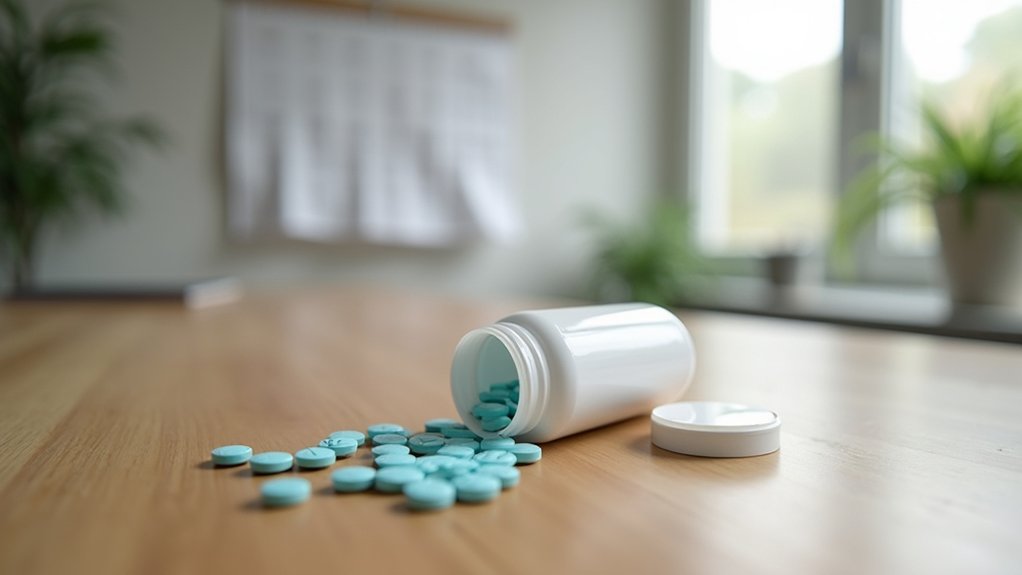Quality addiction recovery care includes thorough assessment of your medical, psychological, and social needs, followed by individualized treatment planning that incorporates evidence-based therapies like CBT and motivational interviewing. You’ll receive medication-assisted treatment when appropriate, holistic approaches addressing physical and emotional wellness, and integrated support for co-occurring mental health conditions. Professional programs also provide family involvement, peer support systems, and structured aftercare planning. Understanding these essential components will help you identify programs that offer the most effective path forward.
Comprehensive Assessment and Individualized Treatment Planning

When you’re seeking quality addiction recovery care, the foundation of effective treatment begins with a thorough assessment that evaluates every aspect of your life affected by substance use. This multifaceted evaluation examines your medical history, psychological state, social circumstances, and legal factors through clinical interviews, standardized screening tools like ASI and AUDIT, and laboratory testing.
Your treatment team will assess substance use patterns, mental health conditions, family dynamics, and readiness for change. The assessment process requires establishing a safe, non-judgmental environment to encourage accurate reporting of your substance use history, especially given the significant stigma that often surrounds addiction. Cultural competency assessment guarantees your background and values are respected throughout treatment. This expansive data creates an individualized treatment plan that addresses your specific needs, determines appropriate care levels, and includes ongoing risk evaluation.
Regular reassessments allow your plan to evolve, making sure you receive personalized care that promotes lasting recovery and improved quality of life. Through collaborative approach, you become an active participant in developing your recovery strategy, which increases your commitment to the treatment process and enhances the likelihood of achieving sustainable, long-term change. Quality addiction treatment recognizes that co-occurring mental health issues frequently accompany substance abuse disorders and require integrated treatment approaches.
Evidence-Based Clinical Interventions and Therapies
Once your individualized treatment plan is established, evidence-based clinical interventions become the cornerstone of effective addiction recovery care. These protocols are scientifically proven to reduce relapse risk and support long-term recovery across various substance use disorders.
Evidence-based clinical interventions form the foundation of successful addiction treatment, significantly reducing relapse rates through scientifically validated therapeutic protocols.
Quality treatment centers integrate multiple therapeutic approaches tailored to your specific needs:
- Cognitive Behavioral Therapy (CBT) – helps you identify triggers, challenge dysfunctional beliefs, and develop effective coping strategies
- Contingency Management – provides positive reinforcement through vouchers or prizes for maintaining abstinence and treatment adherence
- Motivational Interviewing – enhances your intrinsic motivation to change through collaborative, client-centered conversations
- Family-Based Interventions – involves your support network to improve communication and address relationship dynamics affecting recovery
These evidence-based protocols often incorporate peer-led programming, creating all-encompassing support systems that address the complex nature of addiction recovery. For individuals struggling with less severe dependency, brief interventions ranging from 5 minutes to 30 minutes can serve as effective first-level treatments due to their cost-effectiveness. Many treatment programs also utilize experiential therapies like art, music, and adventure therapy to help process complex emotions and trauma that cannot be easily articulated through traditional talk therapy approaches. Research consistently demonstrates that treatment retention and duration correlate with positive outcomes across different therapeutic modalities.
Medication-Assisted Treatment Integration

Beyond traditional therapeutic approaches, Medication-Assisted Treatment (MAT) represents a scientifically backed pathway that addresses the biological foundations of addiction while supporting your psychological recovery journey. MAT combines FDA-approved medications like methadone, buprenorphine, or naltrexone with counseling and behavioral therapies to reduce cravings and withdrawal symptoms effectively.
Your success depends on thorough clinical assessments that tailor medication and therapy to your specific needs. Quality programs provide regular monitoring, dose adjustments, and ongoing behavioral support, including goal setting and mindfulness training. MAT also significantly reduces overdose risk during the critical detoxification period when patients are most vulnerable. When considering medication assisted treatment provider selection, evaluate success rates and available behavioral health resources. Medication-assisted treatment stigma reduction through education helps create supportive environments for recovery. Programs addressing your medical, psychological, and social needs while ensuring accessibility maximize your potential for sustained recovery and improved quality of life.
Holistic and Integrated Recovery Approach
Your recovery journey extends far beyond simply stopping substance use; it encompasses healing your mind, body, and spirit through multiple interconnected dimensions. Quality addiction recovery programs integrate complementary therapeutic modalities like mindfulness practices, nutritional support, and creative therapies alongside traditional treatments to address your whole person. This all-encompassing approach helps you build sustainable wellness skills that support long-term flourishing rather than focusing solely on achieving sobriety. These holistic counseling methods explore the interconnection of various life aspects through talk therapy, art therapy, and other creative modalities that help you develop effective coping techniques for emotional challenges. Establishing healthy sleep habits becomes a fundamental component of your wellness foundation, supporting both physical healing and emotional stability throughout recovery. Exercise and physical activities serve as powerful tools in your recovery toolkit, helping reduce cravings while promoting abstinence and improving your overall quality of life.
Addressing Multiple Recovery Dimensions
Breaking free from addiction requires more than just stopping substance use; it demands a holistic approach that addresses every aspect of your life. Quality recovery care recognizes that addiction affects multiple dimensions simultaneously, requiring extensive intervention strategies.
Your recovery journey involves addressing interconnected areas that influence your well-being:
- Physical wellness through proper nutrition, exercise, sleep restoration, and medical monitoring
- Emotional health via therapy, trauma-informed care, and mental health treatment
- Social connections, including family therapy, peer support, and community engagement opportunities
- Spiritual growth through exploring meaning, values, and purpose-driven activities
This multidimensional approach acknowledges that sustainable recovery emerges when all aspects of your life receive attention. These dimensions are interconnected and can impact each other positively or negatively throughout your healing process. Quality recovery programs also emphasize occupational wellness by helping you find work that aligns with your values while maintaining healthy work-life balance. Modern treatment standards now include person-centered considerations as a key dimension to ensure your unique circumstances and preferences guide the recovery process. By developing intrinsic motivation across these domains, you’ll build resilience against relapse triggers while creating a foundation for long-term transformation and meaningful recovery.
Complementary Therapeutic Modalities
Modern recovery programs integrate complementary therapeutic modalities that work alongside traditional treatment methods to address your unique healing needs. These evidence-based approaches support your physical, emotional, and spiritual transformation throughout recovery.
| Modality Type | Key Benefits |
|---|---|
| Mind-Body Therapies | Yoga and tai chi reduce cravings while improving stress management |
| Acupuncture | Decreases withdrawal symptoms and improves treatment retention |
| Creative Arts | Music and art therapy facilitate trauma processing and emotional expression |
| Movement-Based | Pilates and dance therapy promote body awareness and positive self-care |
| Cultural Practices | Traditional healing methods offer cultural immersion and community connection |
You’ll find these holistic interventions particularly valuable when combined with conventional treatment. Meditation practices enhance emotional stability, while nutritional support repairs physical deficiencies. Drumming activities offer unique therapeutic benefits by producing theta-wave production and brain-wave synchronization that can enhance relaxation and emotional release during recovery. Cultural immersion through traditional healing ceremonies strengthens your connection to community and spiritual practices that support long-term recovery success. Healthcare providers can use the ECHO tool to help guide selection of complementary therapies based on their efficacy, cost, potential harm, and patient preferences.
Wellness Beyond Sobriety
How does true recovery extend far beyond simply stopping substance use? Quality addiction recovery care recognizes that wellness beyond sobriety encompasses your complete transformation across physical, emotional, and spiritual dimensions. You’ll discover that sustainable recovery requires addressing underlying trauma, developing healthy coping mechanisms, and rebuilding your sense of purpose and connection.
Comprehensive wellness programming includes:
- Empowerment training that builds self-efficacy and autonomous decision-making skills
- Wellness coaching for ongoing lifestyle modification and environmental trigger management
- Mind-body practices like meditation and yoga that enhance emotional regulation
- Nutritional counseling and physical activity programs supporting brain and body healing
Through holistic aftercare planning, you’ll develop long-term strategies that foster continued growth, prevent relapse, and create meaningful life changes that extend well beyond initial sobriety achievements. Community and peer support programs provide essential connection and accountability that strengthen your recovery foundation through shared experiences and mutual encouragement.
Continuity of Care and Aftercare Support Systems
Everyone deserves sustained support that extends far beyond the initial treatment phase, as addiction recovery isn’t a destination but an ongoing journey requiring extensive aftercare systems. Quality programs provide continuing care outcomes through coordinated shifts from intensive services to outpatient options, minimizing dangerous gaps that increase relapse risk. You’ll benefit most from all-encompassing aftercare combining professional group therapy, individual counseling, and peer-based support like AA, with research showing 90% abstinence rates when both are utilized together.
Effective programs maintain contact for 3-6 months minimum, though better results occur beyond 12 months. Staff competency training guarantees seamless handoffs and ongoing assessments that dynamically adjust your interventions. Without proper continuity, 35% of clients report substance use within a month post-discharge, highlighting why sustained support systems are absolutely essential.
Family and Social Network Involvement

Your recovery journey doesn’t happen in isolation; it involves the people closest to you who’ve also been affected by addiction’s ripple effects. Through family education and therapy, you’ll work together to rebuild trust, develop healthy communication patterns, and create a supportive environment that strengthens everyone’s well-being. Building broader support networks and addressing collective trauma helps establish the foundation you need for sustained recovery while healing relationships that matter most.
Family Education and Therapy
When addiction affects one person, it inevitably impacts the entire family system, creating ripple effects that can persist long after treatment begins. Family education and therapy provide essential tools to break destructive patterns and rebuild healthy relationships.
Multifamily group therapy and structured family interventions help you understand addiction’s biopsychosocial effects while developing practical skills for supporting recovery. These evidence-based approaches focus on improving communication, identifying triggers, and establishing boundaries that protect everyone’s well-being.
Key components of effective family therapy include:
- Recognizing enabling behaviors and replacing them with supportive accountability
- Learning relapse prevention planning strategies specific to family dynamics
- Developing healthy communication patterns that rebuild trust and reduce conflict
- Building coping mechanisms to manage your own stress and emotional responses
This collaborative approach substantially improves treatment engagement and long-term recovery outcomes.
Building Support Networks
Beyond family involvement, recovery thrives when you’re surrounded by a broader network of supportive relationships. Building these connections substantially increases your abstinence rates and overall well-being while reducing stress and relapse risk.
Peer mentorship programs offer invaluable mutual encouragement and accountability. When you participate in organizations like AA or similar groups, you’ll find role models who reinforce sobriety norms and provide practical guidance. These connections increase treatment retention and help you develop healthier coping mechanisms.
Community-based recovery resources expand your support system beyond immediate circles. Larger networks composed of abstinent individuals create positive social control, monitoring your progress while discouraging substance use. You’ll experience greater self-efficacy, improved treatment attendance, and enhanced long-term sobriety when embedded within recovery-supportive communities that understand your journey.
Healing Collective Trauma
Collective trauma ripples through families and communities, creating wounds that extend far beyond individual experiences. When addiction intersects with collective trauma from disasters, violence, or systemic oppression, healing requires addressing these shared wounds alongside individual recovery.
Your healing journey benefits greatly when family and social networks actively participate in recovery processes. Community-based interventions validate shared experiences while reducing isolation and stigma that often accompany both trauma and addiction.
Effective collective trauma healing includes:
- Family-based interventions that rebuild trust and enhance communication within your support system
- Multigenerational approaches addressing generational trauma transmission patterns affecting long-term outcomes
- Group psychotherapy processing collective losses while fostering empathy and resilience
- Trauma-informed care principles ensuring safety, collaboration, and cultural sensitivity throughout treatment
These expansive approaches restore agency and strengthen the entire network supporting your recovery.
Co-Occurring Disorder Treatment
Recovery becomes considerably more complex when you’re facing both a substance use disorder and a mental health condition simultaneously. You’ll need integrated care that addresses both conditions together rather than treating them separately. This approach drastically improves your outcomes, reducing substance use while better managing psychiatric symptoms and decreasing hospitalization rates.
Evidence-based therapies like CBT and DBT help you develop essential coping skills, while motivational interviewing increases your engagement in treatment. You’ll benefit from multidisciplinary teams including psychiatrists, psychologists, and addiction specialists who coordinate your care. All-inclusive services encompass case management, housing support, and employment assistance. Long term follow up guarantees continuity of care, while effective relapse prevention strategies help you maintain recovery by treating your whole person, not isolated symptoms.
Professional Standards and Accredited Care Environment
When choosing addiction treatment, you’ll want to verify your facility meets rigorous professional standards through recognized accreditation. Organizations like CARF and Joint Commission provide essential regulatory oversight, ensuring centers maintain the highest quality care standards.
Accredited facilities demonstrate their commitment to excellence through:
- Qualified personnel with proper licensing, credentials, and ongoing education in evidence-based addiction treatment
- Continuous quality improvement practices, including regular audits, outcome tracking, and corrective action protocols
- Person-centered care requirements that mandate individualized treatment planning tailored to your specific needs
- Strict safety and environmental standards covering everything from medication management to emergency protocols
These accreditations aren’t just paperwork; they’re your assurance that the facility follows scientifically validated treatments, maintains qualified staff, and prioritizes your safety throughout recovery.
Frequently Asked Questions
How Much Does Quality Addiction Recovery Treatment Typically Cost?
Quality addiction recovery treatment typically costs $13,475 on average, but you’ll find significant variation based on your needs. Inpatient programs range $6,000–$30,000 for 30 days, while outpatient care costs $1,450–$11,000 for three months. Don’t let price deter you; many facilities offer affordable payment options and customized treatment plans that fit your budget. Insurance coverage, sliding-scale programs, and financing can substantially reduce your out-of-pocket expenses, making quality care accessible.
What Insurance Plans Cover Comprehensive Addiction Recovery Programs?
Most insurance plans now cover broad addiction recovery programs due to federal parity laws. You’ll find coverage through ACA Marketplace plans, employer-sponsored insurance, Medicaid, Medicare, and private HMO/PPO plans. However, your specific insurance policy provisions determine which services are covered and at what cost. You should verify that treatment facility accreditations meet your insurer’s network requirements, as coverage levels vary considerably between plans and may require pre-authorization for certain treatments.
How Long Does the Average Quality Addiction Treatment Program Last?
Quality addiction treatment programs typically last 90 days minimum, as research shows this duration provides the best outcomes for sustained recovery. You’ll find programs ranging from 30-day initial treatment to extended care spanning several years. The most effective approaches include step-down care shifts, holistic aftercare planning, and ongoing alumni support programs. Your program length depends on addiction severity, progress made, insurance coverage, and personal circumstances, with longer durations consistently showing better long-term results.
Can I Continue Working While Enrolled in Addiction Recovery Treatment?
Yes, you can absolutely continue working during addiction recovery treatment. Quality programs offer flexible scheduling, evening and weekend sessions, and telehealth options to accommodate your work schedule. You’re more likely to complete treatment successfully and maintain sobriety when employed. Programs can support part time employment if needed and coordinate medication management with your work schedule. Employment actually improves recovery outcomes, so maintaining work while in treatment benefits your overall recovery journey.
What Happens if I Relapse During or After Treatment?
Relapse doesn’t mean you’ve failed, it’s a common part of recovery that signals your treatment plan needs adjustment. Your care team will reassess your approach, potentially recommending additional therapies or increased support. You’ll focus on coping with setbacks through enhanced monitoring and counseling. Together, you’ll work on exploring relapse prevention strategies to strengthen your recovery foundation. Remember, relapse indicates addiction requires ongoing management as a chronic condition, not treatment failure.





